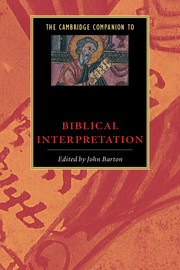Book contents
- Frontmatter
- Introduction
- Part 1 Lines of approach
- 1 Historical-critical approaches
- 2 Literary readings of the Bible
- 3 The social world of the Bible
- 4 Poststructuralist approaches New Historicism and postmodernism
- 5 Political readings of Scripture
- 6 Feminist interpretation
- 7 Biblical studies and theoretical hermeneutics
- 8 The Bible and Christian theology
- 9 Biblical study and linguistics
- 10 Aspects of the Jewish contribution to biblical interpretation
- 11 The Bible in literature and art
- Part 2 Biblical books in modern interpretation
- General Index
- Index of Biblical References
7 - Biblical studies and theoretical hermeneutics
from Part 1 - Lines of approach
Published online by Cambridge University Press: 28 May 2006
- Frontmatter
- Introduction
- Part 1 Lines of approach
- 1 Historical-critical approaches
- 2 Literary readings of the Bible
- 3 The social world of the Bible
- 4 Poststructuralist approaches New Historicism and postmodernism
- 5 Political readings of Scripture
- 6 Feminist interpretation
- 7 Biblical studies and theoretical hermeneutics
- 8 The Bible and Christian theology
- 9 Biblical study and linguistics
- 10 Aspects of the Jewish contribution to biblical interpretation
- 11 The Bible in literature and art
- Part 2 Biblical books in modern interpretation
- General Index
- Index of Biblical References
Summary
Hermeneutics entails critical reflection on the basis, nature and goals of reading, interpreting and understanding communicative acts and processes. This characteristically concerns the understanding of texts, especially biblical or literary texts, or those of another era or culture. However, it also includes reflection on the nature of understanding human actions, signsystems, visual data, institutions, artefacts or other aspects of life. In biblical studies it applies traditionally to the interpretation of texts, but also the interweaving of language and life both within the horizon of the text and within the horizons of traditions and the modern reader.
It remains helpful to distinguish hermeneutics as critical and theoretical reflection on these processes from the actual work of interpreting and understanding as a first-order activity. Often writers speak loosely of someone's 'hermeneutic' when they discuss only how they go about the task rather than their reasons for doing so and their reflection on what is at issue in the process. The decisive foundation of theoretical hermeneutics as a modern discipline occurred with the work of Friedrich Schleiermacher over the first thirty years of the nineteenth century. All the same, scattered building blocks for modern theory emerge at regular intervals from the ancient world to the post-Reformation period up to Schleiermacher. These might be regarded as constituting the prehistory of theoretical hermeneutics, in the modern sense of the term.
- Type
- Chapter
- Information
- The Cambridge Companion to Biblical Interpretation , pp. 95 - 113Publisher: Cambridge University PressPrint publication year: 1998
- 3
- Cited by



